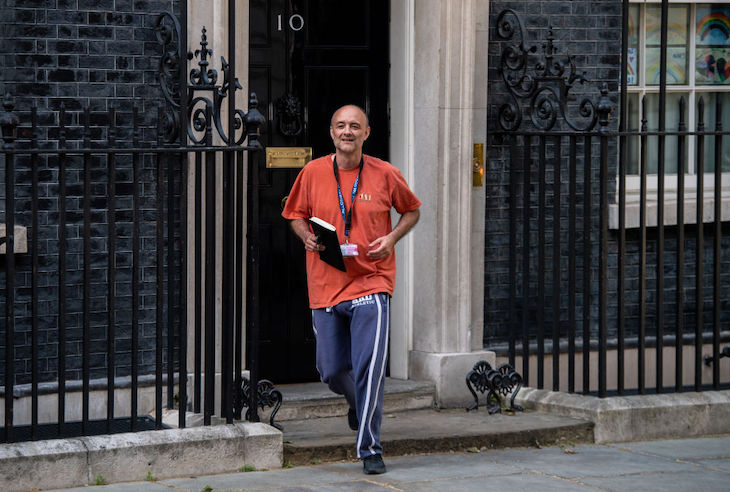Who runs Britain? When Boris Johnson’s lawyers made their case in front of the Supreme Court this week, defending his right to prorogue parliament, they in effect brought it back to this simple question. This was a controversy for politicians to settle, not courts. Judges, they said, should think twice about ‘entering the political arena’ and unsettling the UK’s ‘careful constitutional and political balance’. He may be the first prime minister to frame the matter so starkly, but no previous prime minister has had to. This is about far more than Brexit. Britain is witnessing political litigation on a hitherto unseen scale.
We have a government that has lost a working majority and is being forced by legislation to act against its own central policy. We have a House of Commons that nonetheless refuses to withdraw confidence in the government or allow a general election. We have the Queen who, in Balmoral a few weeks before, granted through her privy council an order to prorogue parliament: a politically controversial decision but in one way a standard procedure. And we have a great many lawyers now seeking to reverse that prorogation by court order.
In the recent past, it would have been laughable to think this could be secured through the courts. But as we have seen, anything is possible — which is why the Supreme Court has this week been asked to consider whether the prime minister acted lawfully when he advised the Queen to prorogue parliament. This is what makes it, in effect, a question about who governs. It’s a question that involves almost all the working parts of the UK’s unwritten constitution. It cuts to the heart of how our democracy functions, with relationships between crown, government and parliament all in the spotlight, not to mention differences between Scottish and English courts. It is the constitutional equivalent of a perfect storm.
Gina Miller is, once again, at the heart of this. She is back in business with Lord Pannick QC, who successfully argued her case on Brexit before the Supreme Court a few years ago. Then, the question was relatively simple: was a new Act of Parliament required before the UK could begin the process of leaving the European Union? Surely, she said, if Britain’s entry into the EU required legislation, then that law would have to be changed by parliament? The High Court and Supreme Court agreed. This time, she asked the High Court to rule that the prime minister acted improperly in seeking to suspend parliament: her case was dismissed. But in Edinburgh, the judges went the other way, with the Scottish Inner House of the Court of Session ruling against the government.
When both rulings ended up in the Supreme Court, we entered new terrain. Not so long ago, it would have been unthinkable for any UK court to rule on the prime minister’s advice to the Queen to prorogue parliament. It’s a classic example of a decision that is not up to the courts: like defense of the realm, the appointment of ministers and much else.
This is not because the government is somehow above the law, but because the law permits the government to decide when and for how long to prorogue parliament. If ministers misuse this power, they can be punished by other MPs and then voters. This is the way things have worked for centuries, and has never (until now) been called into question.
Take Lord Pannick’s case: that this prorogation somehow violates the principle of parliamentary sovereignty. The High Court saw straight through the argument. Parliamentary sovereignty means that Acts of Parliament are our highest source of law. It does not mean that parliament must always be in session. Parliamentary sovereignty is not breached by a gap between sessions or the run up to an election. In any case, for a proceeding in parliament — which is what prorogation is — to be questioned in court is explicitly forbidden by Article 9 of the Bill of Rights 1689.
It’s shocking, yes. But not surprising. It’s just the latest development in the relentless rise of the courts, something I’ve been looking at for four years now, as part of Policy Exchange’s Judicial Power Project. It amounts to a far-reaching change in how we are governed, a change that has taken place with too little scrutiny or challenge. This is a bipartisan concern — in times gone by, many of the most powerful arguments for judicial restraint came from the political left. The project’s work has been met with some hostility from the legal academy and human rights bar, but also with indications that some of our most senior judges share our concerns.
Jonathan Sumption, until recently a Supreme Court judge, devoted his recent Reith lectures to the decline of politics and the rise of law, arguing that litigation is now often simply politics by other means. Those who lose out in the political process (including even retired prime ministers, who ought to know better) are increasingly willing to turn to the courts to try to secure political advantage. Or to foist on the political authorities and the people their vision of what should be done.
And courts which might once have batted this away are increasingly open to this type of litigation, often understanding themselves to be the guardians of the constitution or to have an overarching responsibility for justice. Many judges are worried about this trend, which departs sharply from the common law tradition. Courts should faithfully uphold the law and should not stand in judgment over parliament, or over those elected to serve there. But a rot has been setting in for years.
Part of the blame lies with ‘reforming’ politicians, who sought to give our courts new powers — and who accepted the jurisdiction of foreign courts, like the European Court of Human Rights. The 1998 Human Rights Act was a watershed, introducing into UK law a highly politicized model of judicial action. The result has been a wave of lawsuits inviting courts to challenge the merits of legislation and policy and to unsettle existing law. Some judges have taken up this invitation with enthusiasm. Others have done their best to reconcile it with the limits of judicial competence.
The deeper problem is thinking about lawyers as the guardians of democracy. This runs hand in hand with a notion of ‘the rule of law’ as a kind of master principle, requiring ever-increasing interference from judges. But this would be the rule of judges — not the rule of law.
We have seen this mission-creep time and time again, with courts invoking ‘the rule of law’ to engage in politics by other means. The Supreme Court ordered the disclosure of the Prince of Wales’s letters to the Guardian — in spite of the fact that the government had declared it not in the ‘public interest’ to do so. On whose authority did the judges overrule the government? The Freedom of Information Act was drafted to let ministers decide what was in the public interest and what was not. But the Supreme Court ruled, by five to two, that courts should make this decision.
As Lord Sumption later wrote: ‘The majority’s decision, however dressed up, was that they did not approve of the power that parliament had on the face of it conferred on ministers. Three of the judges thought that it was such a bad idea that parliament could not really have meant what it plainly said.’ As he says, it comes down to a question of who is the best judge of public interest: a government minister, or a judge? That was a question parliament had already answered.
The rise of judicial power in the Brexit text is often described as a defense of the constitution, against an out-of-control government. But the responsibility of courts in our tradition is to uphold law, not what they regard as good constitutional practice. The temptation for courts is to tell themselves that parliament needs the judges to protect it from the government — and this is the only way of doing things, if absolutism in the style of the Stuart monarchs is to be avoided. It is astonishing how quickly such a false analogy can take hold.
Our democracy has (or should have) basic rules. The government holds office only for so long as it enjoys the confidence of the Commons. Should it lose that confidence, a general election needs to be called. Ministers are, quite rightly, subject to political criticism and contestation, but the courts should not be another forum for political attack. If lawyers seek to change the law, they should run for parliament.
The frenzied politics of Brexit have given rise to a bewildering number of legal challenges, as my academic colleagues Aileen McHarg and Chris McCorkindale have chronicled. Many of the more hopeless challenges have failed, but the continuing recourse to the courts is not good for public confidence in either the democratic process or the rule of law.
Wherever the Brexit saga might take us, the problem of over-mighty courts is not going away. This is not a counsel of despair. Parliamentary sovereignty remains good law, and when a government is returned to office that is able to govern, which fully enjoys the confidence of the House of Commons, it should act boldly to restore the constitutional balance. Many judges remain quietly but firmly committed to the common law constitutional tradition. Restoring the UK’s constitutional architecture will not be straightforward, but recognizing the problem is a vital first step. And this week has, if nothing else, given us a spectacular example of the problem.
This article was originally published in The Spectator’s UK magazine. Subscribe to the US edition here.


























